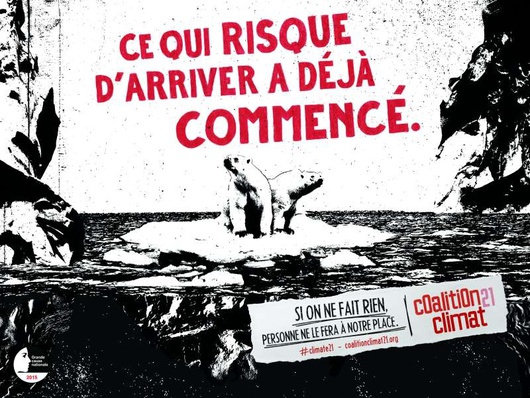
Civil Society at COP21 Paris: If We Don’t Act, Who Will?
Published on
In the aftermath of the recent tragic events in Paris, the Climate Summit will still go on, and so will civil society's response in protection of the environment.
Despite the words of France’s prime minister, Climate Coalition 21 has declared its intention to continue to support civil society responses to COP21, the United Nations climate summit to be held just outside of Paris from 30th November to 11th December 2015.
The Coalition groups together over 130 non-governmental and civil society organizations from around the world - who have been informing the public about the upcoming climate negotiations among world leaders, educating people about the urgency to address climate change, and providing a space for sharing concrete and real solutions to help us safeguard our natural heritage. In a statement issued Tuesday on 17th November 2015, the Coalition writes, “The fight we are undertaking for climate justice does not stop there. We have the responsibility to stand firm and continue to strive for a planet that is just and liveable for all.”
In the wake of recent attacks in Paris that took the lives of some 130 people, the French government, which is hosting the COP21, announced emphatically that the event will go on. The Conference is expected to welcome over 100 leaders and heads of state from almost 200 countries around the world. However, Prime Minister Manuel Valls declared on Monday that the activities of civil society, which has always had a presence at previous COP’s, will be severely curtailed. Valls said on France’s RTL network that the COP21 “will undoubtedly be restricted to the negotiations. Certain concerts, certain rather festive demonstrations, will undoubtedly be cancelled. If we are to organise this great climate meeting, security forces must concentrate on the essential.”
The COP21, to be held at Le Bourget airport, a facility that generally serves private aircraft, is this year’s edition of the annual COP conference of world leaders about the climate. According to the COP21 website, this latest meeting is expected to be marked by a ground-breaking international commitment to hold global temperature increase to 2 degrees Celsius. But many, including already vulnerable Small Island Developing States (SIDS), Least Developed Countries (LDCs) and environmental groups, claim that even an earlier agreement allowing for a 1.5 degrees Celsius increase might not be sufficient to mitigate the devastating effects of climate change. An independent analysis of COP commitments estimates that even if current pledges are abided by, they could only slow global warming to a 2.7 degrees increase, with disastrous results.
The Conference will be organized into three sections: The Blue Zone, for leaders, negotiators and heads of state; The Gallery of Solutions, devoted to climate-oriented businesses; and the so-called “Climate Generations” space, where NGO’s and other associations will be located. Citizens groups have also planned major marches to bookend the negotiations, on 29 November and 12 December, which had already been approved by the French government. According to Monday's article in French newspaper “Le Monde” describing enhanced security after the attacks, the paper writes, “The Gallery, since its participation is by invitation only, will be able to have its activities maintained. The configuration of Climate Generations is still under discussion.”
But Valls is disingenuously targeting civil society to enhance security around COP21, as the move to exclude NGOs and other associations began earlier a few weeks ago in Bonn. Many organizations decried their treatment at that meeting, where the first draft of the climate accords to be finalized in Paris were written behind closed doors, by appearing in the street blindfolded or with their mouths covered in duct tape.
If Valls makes good on his promises to restrict participation in the COP21, leaders of government and business will be discussing and making important decisions about something that affects everyone amongst themselves. Without the presence of civil society at the negotiations, and without providing a space for the general public to learn about, share and exchange ideas concerning climate change, what holds the COP21 to take the rest of the world into account? Protecting the environment is essential for the wellbeing and security of us all.



